考研英语阅读理解讲义备课讲稿共19页文档
- 格式:ppt
- 大小:2.02 MB
- 文档页数:19
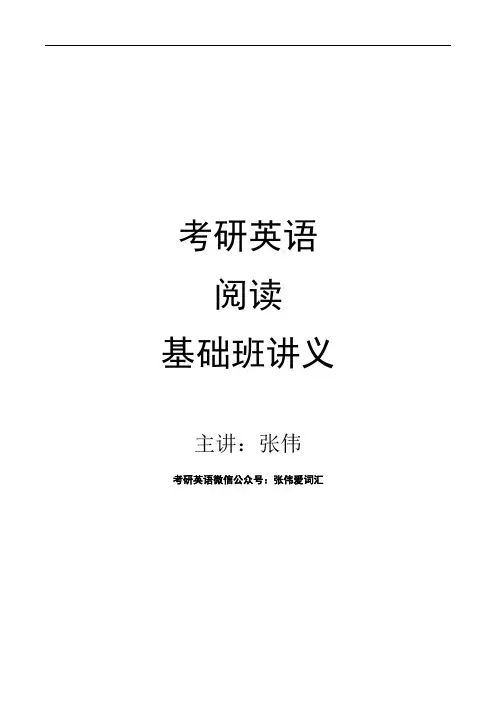

考研英语阅读理解基础班讲义(1)第一部分:对于长难句课程难点重点的回顾非简单句的障碍来源:非简单句:﹛S1,S2,S3,S4,…Sn﹜如何拆分和组合句子非简单句的障碍解决方案一.关联词和主句专一原则关联词:1. 关系代词:that, who,whom,which,what,as,whose,2. 关系连词:if, whether,when,where,3. 标点符号:, ----;4. 并列连词:and,or主句专一原则:1. 一个句子只能有一个主句,主句中没有关联词。
2. 一个句子中有n个分句,则只有n-1个关联词。
例证:句子之间的关联方式u 1.并列l 并列联词的用法例 1..Itis alittle upsettingto read that acertainline describesafight betweenaTurkishanda Bulgarianofficerandto find that the line consistsofthe noiseoftheir falling andthe weightsof theofficers,"Pluff!Pluff!"Ahundredandeighty-fivekilograms.u 2.主从复合(嵌套)主从复合句的分类:三大从句:名词性从句:主语从句,宾语从句,表语从句,同位语从句形容词性从句:定语从句副词性从句:状语从句常见的关联词:法硕联盟论坛/doc/32299d12866fb84ae45c8d64.html 祝您考研成功!-2-名词性从句:关系代词:what,who,whom,which,关系连词:that,when,where,how,形容词性从句:见定语从句副词性从句:见后表格;名词性从句的分类讲解:状语从句种类常用连接词特殊连接词时间状语从句When,while,as,before,since,till,until,assoonas1.一些时间名词:themoment,theinstant,theminute,theday,nexttime,everytime2.一些副词:instantly,immediately,directly3.固定搭配的连词:nosooner---than,hardly---when,scarcely---when.地点状语从句Where Wherever,anywhere,everywhere原因状语从句Because,as,for,sinceSeeingthat,consideringthat,nowthat,giventhat,inthat,inasmuchas,insomuchas目的状语从句Sothat,inorderthat,thatLest,forfearthat,incase,inthehopethat,onpurposethat,forthepurposethat,totheendthat结果状语从句So---that,sothat,such---thatSuchthat,tothedegreethat,totheextentthat,tosucha degreethat,tosuchanextentthat条件状语从句If,unless Suppose,supposing,providing,provided(特别关注:supposed,provide不用作条件从句的连词)onconditionthat,solongas,aslongas让步状语从句Although,though,eventhough,evenifWhile(一般用在句首),as(用于倒装结构),whatever,whoever,whichever,however,whenever,wherever,whether---or---,asadj.as+主谓结构用在句首比较状语从句As,than Themore---,themore---;justas---,so---;A istoB what/asC istoD;nomore--than;notA somuchasB/notsomuchA asB方式状语从句as,theway主语从句:结构识别:(1).关系连词+句子+动词(2).It+be动词+形容词/名词短语+关系连词+句子(3).It+不及物动词+that例子:1.Thattheseasarebeingoverfishedhasbeenknownforyears.2.Thattheplatesaremovingisnotbeyonddispute.3.Whathappenedonthe GuangMingDingwillbeforeveretchedinzhangwuji’smemory.4.Itis generally agreed that a personofhighintelligence is onewhocan graspideas法硕联盟,在读学长答疑,2011年北大及人大法律硕士状元均为本站会员!-3-readily, makedistinctions,reason logically, andmakeuseofverbaland mathematicalsymbolinsolvingproblems.人们普遍认为,高智商的人有这样一些特点:理解力强,辨别力强,逻辑推理能力强,并且在解决问题的过程中善于利用文字或数学符号。
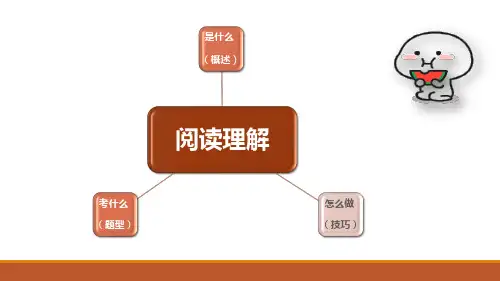

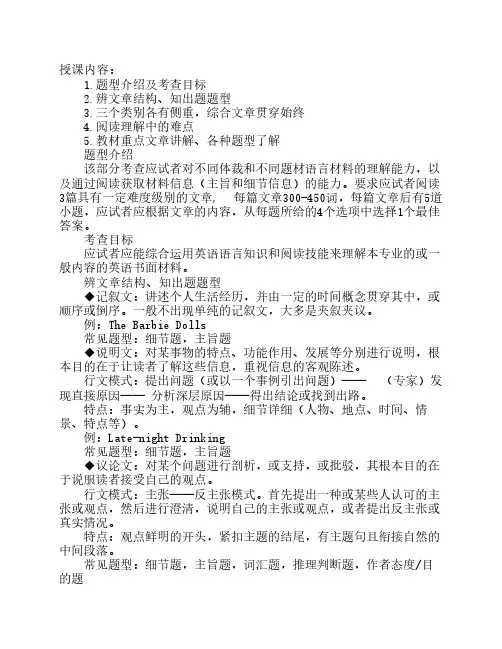
授课内容: 1.题型介绍及考查目标 2.辨文章结构、知出题题型 3.三个类别各有侧重,综合文章贯穿始终 4.阅读理解中的难点 5.教材重点文章讲解、各种题型了解 题型介绍 该部分考查应试者对不同体裁和不同题材语言材料的理解能力,以及通过阅读获取材料信息(主旨和细节信息)的能力。
要求应试者阅读3篇具有一定难度级别的文章, 每篇文章300-450词,每篇文章后有5道小题,应试者应根据文章的内容,从每题所给的4个选项中选择1个最佳答案。
考查目标 应试者应能综合运用英语语言知识和阅读技能来理解本专业的或一般内容的英语书面材料。
辨文章结构、知出题题型 ◆记叙文:讲述个人生活经历,并由一定的时间概念贯穿其中,或顺序或倒序。
一般不出现单纯的记叙文,大多是夹叙夹议。
例:The Barbie Dolls 常见题型:细节题,主旨题 ◆说明文:对某事物的特点、功能作用、发展等分别进行说明,根本目的在于让读者了解这些信息,重视信息的客观陈述。
行文模式:提出问题(或以一个事例引出问题)—— (专家)发现直接原因—— 分析深层原因——得出结论或找到出路。
特点:事实为主,观点为辅,细节详细(人物、地点、时间、情景、特点等)。
例:Late-night Drinking 常见题型:细节题,主旨题 ◆议论文:对某个问题进行剖析,或支持,或批驳,其根本目的在于说服读者接受自己的观点。
行文模式:主张——反主张模式。
首先提出一种或某些人认可的主张或观点,然后进行澄清,说明自己的主张或观点,或者提出反主张或真实情况。
特点:观点鲜明的开头,紧扣主题的结尾,有主题句且衔接自然的中间段落。
常见题型:细节题,主旨题,词汇题,推理判断题,作者态度/目的题 三个类别各有侧重,综合文章贯穿始终 1.阅读理解三篇文章,由易到难,分别与另两个级别过渡; 2.三篇文章中,有一篇取自教材,但会有改变; 3.三篇文章中,有一篇为综合、理工、卫生共有,通常为综合类文章; 4.阅读理解考题考点呈现多样性; 5.文章后面问题的设置顺序通常是按照文章的发展顺序设置。
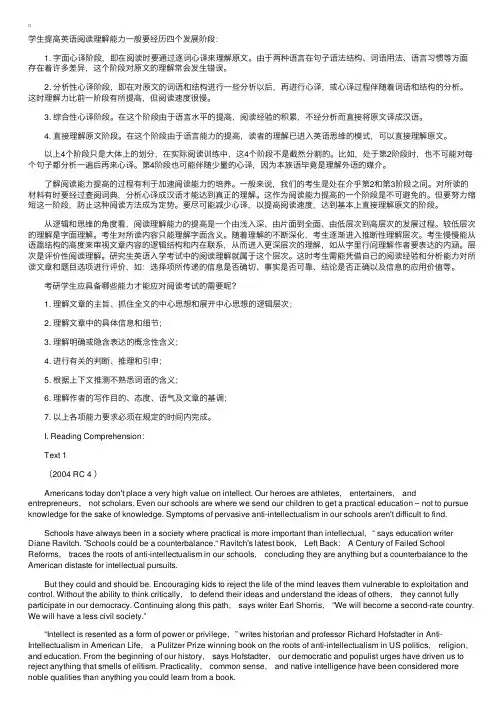
学⽣提⾼英语阅读理解能⼒⼀般要经历四个发展阶段: 1. 字⾯⼼译阶段,即在阅读时要通过逐词⼼译来理解原⽂。
由于两种语⾔在句⼦语法结构、词语⽤法、语⾔习惯等⽅⾯存在着许多差异,这个阶段对原⽂的理解常会发⽣错误。
2. 分析性⼼译阶段,即在对原⽂的词语和结构进⾏⼀些分析以后,再进⾏⼼译,或⼼译过程伴随着词语和结构的分析。
这时理解⼒⽐前⼀阶段有所提⾼,但阅读速度很慢。
3. 综合性⼼译阶段。
在这个阶段由于语⾔⽔平的提⾼,阅读经验的积累,不经分析⽽直接将原⽂译成汉语。
4. 直接理解原⽂阶段。
在这个阶段由于语⾔能⼒的提⾼,读者的理解已进⼊英语思维的模式,可以直接理解原⽂。
以上4个阶段只是⼤体上的划分,在实际阅读训练中,这4个阶段不是截然分割的。
⽐如,处于第2阶段时,也不可能对每个句⼦都分析⼀遍后再来⼼译。
第4阶段也可能伴随少量的⼼译,因为本族语毕竟是理解外语的媒介。
了解阅读能⼒提⾼的过程有利于加速阅读能⼒的培养。
⼀般来说,我们的考⽣是处在介乎第2和第3阶段之间。
对所读的材料有时要经过查阅词典,分析⼼译成汉语才能达到真正的理解。
这作为阅读能⼒提⾼的⼀个阶段是不可避免的。
但要努⼒缩短这⼀阶段,防⽌这种阅读⽅法成为定势。
要尽可能减少⼼译,以提⾼阅读速度,达到基本上直接理解原⽂的阶段。
从逻辑和思维的⾓度看,阅读理解能⼒的提⾼是⼀个由浅⼊深、由⽚⾯到全⾯、由低层次到⾼层次的发展过程。
较低层次的理解是字⾯理解。
考⽣对所读内容只能理解字⾯含义。
随着理解的不断深化,考⽣逐渐进⼊推断性理解层次。
考⽣慢慢能从语篇结构的⾼度来审视⽂章内容的逻辑结构和内在联系,从⽽进⼊更深层次的理解,如从字⾥⾏间理解作者要表达的内涵。
层次是评价性阅读理解。
研究⽣英语⼊学考试中的阅读理解就属于这个层次。
这时考⽣需能凭借⾃⼰的阅读经验和分析能⼒对所读⽂章和题⽬选项进⾏评价,如:选择项所传递的信息是否确切、事实是否可靠、结论是否正确以及信息的应⽤价值等。
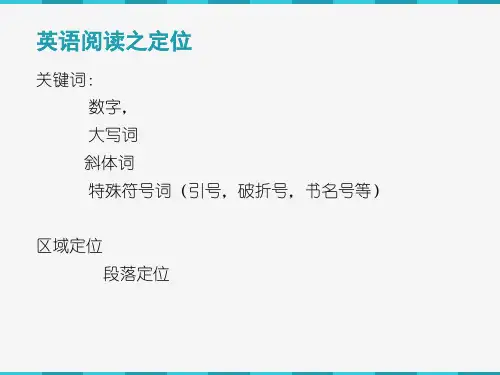
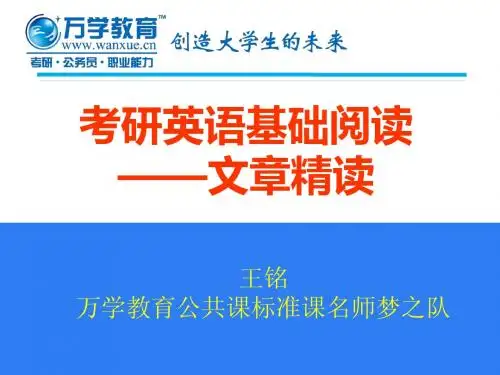
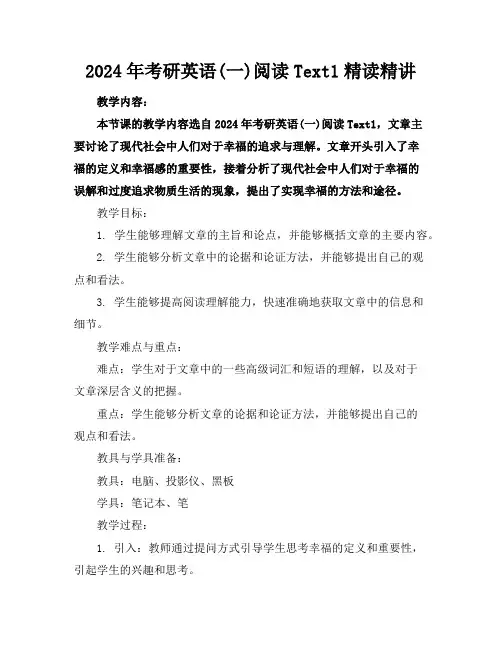
2024年考研英语(一)阅读Text1精读精讲教学内容:本节课的教学内容选自2024年考研英语(一)阅读Text1,文章主要讨论了现代社会中人们对于幸福的追求与理解。
文章开头引入了幸福的定义和幸福感的重要性,接着分析了现代社会中人们对于幸福的误解和过度追求物质生活的现象,提出了实现幸福的方法和途径。
教学目标:1. 学生能够理解文章的主旨和论点,并能够概括文章的主要内容。
2. 学生能够分析文章中的论据和论证方法,并能够提出自己的观点和看法。
3. 学生能够提高阅读理解能力,快速准确地获取文章中的信息和细节。
教学难点与重点:难点:学生对于文章中的一些高级词汇和短语的理解,以及对于文章深层含义的把握。
重点:学生能够分析文章的论据和论证方法,并能够提出自己的观点和看法。
教具与学具准备:教具:电脑、投影仪、黑板学具:笔记本、笔教学过程:1. 引入:教师通过提问方式引导学生思考幸福的定义和重要性,引起学生的兴趣和思考。
2. 阅读理解:教师引导学生快速阅读文章,回答一些简单的问题,帮助学生理解文章的大意和结构。
3. 细节理解:教师引导学生仔细阅读文章,找出文章中的关键信息和细节,并进行解释和解读。
4. 分析论证:教师引导学生分析文章中的论据和论证方法,帮助学生理解作者的观点和看法。
5. 小组讨论:教师将学生分成小组,让学生讨论自己对于幸福的理解和追求,并分享自己的观点和经验。
板书设计:幸福的定义和重要性追求幸福的误解和现象实现幸福的方法和途径作业设计:1. 请简述文章的主旨和论点。
2. 分析文章中的论据和论证方法,并提出自己的观点和看法。
3. 请结合自己的经历,谈谈对于幸福的理解和追求。
课后反思及拓展延伸:教师在课后要对自己的教学进行反思,看看是否达到了教学目标,学生是否掌握了文章的主要内容和观点,以及是否能够运用所学知识和技能。
同时,教师还可以引导学生进行拓展延伸,让学生进一步思考和探讨幸福的社会意义和个人价值,以及如何在日常生活中实现幸福。


考研英语阅读总课件一、引言考研英语作为研究生入学考试的重要组成部分,对于考生而言,英语阅读理解能力的提高至关重要。
本课件旨在帮助考生掌握考研英语阅读的技巧和方法,提高阅读理解能力,从而在考试中取得优异成绩。
二、考研英语阅读题型及解题策略1.题型概述考研英语阅读主要包括完型填空、阅读理解两部分。
其中,阅读理解部分包括多项选择题和简答题两种题型。
2.解题策略(1)完型填空完型填空主要考查考生对英语文章的整体理解和细节把握能力。
解题时,考生应通读全文,把握文章主旨和大意。
然后,针对每个空格,结合上下文语境,分析选项的词义、词性和搭配,选出最佳答案。
(2)阅读理解①确定题型:判断题目是事实细节题、推理判断题还是主旨大意题;②寻找定位:根据题目中的关键词,在文章中找到与之对应的信息;③分析选项:对比选项,排除干扰项,确定正确答案;④核对答案:将所选答案代入原文,检查是否符合文章内容。
三、考研英语阅读技巧1.提高词汇量词汇是英语阅读的基础,考生应通过大量阅读,积累词汇量。
同时,要学会根据上下文推测词义,提高阅读速度。
2.培养语感语感是指对英语句子结构的敏感度。
考生在日常学习中,要多读、多背、多模仿,培养良好的语感。
3.提高阅读速度①扫读:快速浏览文章,把握文章结构和主旨;②精读:针对重点段落和句子,仔细阅读,理解文章细节;③跳读:根据题目要求,有针对性地查找信息。
4.学会做笔记在阅读过程中,要学会做笔记,将关键信息、重要观点和生词记录下来,方便做题时查找。
四、考研英语阅读训练方法1.大量阅读考生应充分利用课余时间,阅读各类英语文章,如新闻、科普、文学等,提高阅读理解能力。
2.做真题研究历年考研英语阅读真题,总结出题规律和答题技巧,提高实战能力。
3.模拟考试定期进行模拟考试,检验自己的阅读水平,发现问题,及时调整学习方法。
五、总结考研英语阅读理解能力的提高需要考生在日常学习中不断积累和练习。
本课件旨在为考生提供一种有效的学习方法,帮助考生掌握阅读技巧,提高阅读速度和理解能力。
1: From Competence to Commitment1. competence n. = being able to do sth well, ability 能力/ have competence for /as /in sth || have competence in doing sth || competence to do sth e.g.: The committee has no actual competence in criminal matters. / No one doubts her competence as a teacher. / No one doubts her competence in solving the problem. // competent adj. competent as /at / in sth || competent to do sth e.g. She is not compete nt to look after young children / He is a highly competent driver.mitment n. [C] the hard work and loyalty that sb. gives to an organization activity 承担的义务, 承诺:commitment to sth || commitment to do sth e.g.: We must honour our commitments to small nations. / He has taken on too many commitments. / We made a commitment to pay our bills on time.3. Ernest Boyer: a former Commissioner of Education in USA. In the article, Ernest Boyer discusses a lot of problems about higher education in the US and he also tells us how to solve these problems. Ernest Boyer is sure that undergraduate education can make a difference in the intellectual and personal lives of its students.4.ambiguous adj. = 意义含糊的, 有歧义的,e.g.: He kept making ambiguous remarks instead of straightforward yes-or-no replies. || ambiguousness n. / ambiguity n.5. devote oneself/ sth to:= 为某人、某事(付出时间、精力等)e.g.: devote ourselves to our study. Here "to" is a preposition. Pay attention to the following prepositional "to": acceptable to / according to / accustomed to / adequate to / adjust to / admit to / approach to / attach to / pay attention to / attribute to / belong to / close to / contrary to contribute to / devote to / due to / equal to / exception to / inferior to / look forward to / married to / native to / necessary to / next to / opposed to / preferable to / prior to / refer to / related to / relevant to / solution to / stick to / subject to / take to / thanks to || Pay attention to the phrase "be devoted to sth/ sb", in which "devoted" is an adjective meaning loving or loyal.6. establish themselves (in sth /as sth)= place sb/oneself in a position, office, etc, usu. on a permanent basis. 使某人任职,使某人成为,安顿e.g.: He has established himself as the leading candidate in the election. / He has now comfortably established in his new house. / The manager established (安排) his relatives in the best jobs.7. admitted to ("to" is a preposition): confess; recognize or acknowledge sth as true, often reluctantly: 承认、坦白e.g.: He admitted to themurder. / He admitted to having taken the money. / The Vice President admitted to taking bribes. / A quarter of workers admitted to taking time off when they were not ill. // C.f. admit of: make it possible for sth., to happen or to be true 留有...的余地e.g.: The price quoted will not admit of any allowance. / His conduct admits of no complain. / The word admits of no other meaning in this case.8.They are torn by idealism of service on the one hand, and on the other, the temptation of retreat into a world that never rises above self-interest = Ideally, they would like jobs which serve other people, but on the other hand they are also attracted by careers which will serve their own interest. // be torn by:be tortured and puzzled by sth.折磨e.g.: There are still quite a few nations torn by civil war or riots. / The party was torn by two factions. // It may also means: feel very worried, guilty, anxious, etc. because one is affected by a strong emotion or feeling.(感情上)感到担心、内疚、焦虑e.g.: I was torn by conflicting impulses. / Her heart was torn by anxiety. || rise above超出...之上,克服(缺点、困难):succeed in what you are doing without being affected by it e.g.: Mate raised above all the trouble at home and did well in her classes. / Mike had risen above his limiting social position and made it as a successful businessman. / A woman who can rise above such disadvantages is clearly exceptional.9. undergraduate experience = undergraduate education10. Reinhold Niebuhr: An American theologian (神学家)(1892-1971)11. Man cannot behold except he be committed. = People cannot realize their own potential unless they devote themselves to society. // behold (old use)= see, realize // except = unless e.g.: Except a man be born again, he cannot see the Kingdom of God .12. the idealism of the undergraduate experience = the perfect or ideal collegiate education (As undergraduates, students often have views which are idealistic and perhaps not very practical.)13. hard-edged adj. = tough14.integrity n. = uprightness, honesty, being unprejudiced 诚实、正直15. civility n. [C], [U] = politeness 礼貌// c.f.: civil adj. 公民的、文职的e.g.: civil law, civil right / the Civil Service 行政机关、公务员e.g.: She works in the Civil Service. / civic adj. 市镇的、公民身份的e.g.: civic responsibility / civilian n. [C] 老百姓e.g.: Two civilians were killed in the explosion. / civilize vt. 使(某人、某物文明、开化/ civilization n. [C]、[U]:civilizations of ancient Egypt and Babylon16. compassion n. [U]: = pity 同情心/ compassion (for sb.) e.g.: Their sufferings aroused our compassion. // compassionate adj. 有同情心的,怜悯的e.g.: He is compassionate to the helpless.17. humaneness (old use) n. = humanity 人,人道// c.f.: humane adj. 富于同情心的/humanitarian adj. 人道主义的,博爱的/ humanism n. 人道主义,人本主义/ humanities人文学科,文、历、哲学科/ humanize vt. 人格化/ humanization n. 人格化18. atmospheric adj. atmospheric pressure 气压/ atmosphere n.19. semi-metaphysical adj. partially based on abstract reasoning20. bafflement n. [U] = puzzlement || baffle vt. e.g.: One of the exam questions baffled me.21.deterrence n. [U] = threat e.g.: nuclear deterrence 核威慑/ deterrent adj. deterrent weapons 威慑性武器/ vt. deter sb. from doing sth. e.g.: Failure did not deter him (from making another attempt.)22. desegregation n. [U] = abolition of racial separation / c.f.: segregation23. drainage n. [U] / drain vt. 排(水)24. licensing requests许可的要求// license v. / licence n.25. technicalities = technical terms26. unchallenged adj. be accepted and believed by everyone; not doubted27. at stake = in a situation where sth valuable might be lost. E.g.: They played much better in the next game because they felt that the honor of the school was at stake. / We cannot simply give in to their demands; matters of principle are at stake.28.tolerable adj. 可以忍受的c.f.: tolerant (of sth/sb)|| tolerance宽容的|| tolerate v.29. Pay attention to parallelism in this sentence, which is to enforce emphasis." unless... unless"30. band together (a phrase) v. = unite e.g.: band together to protest. / band together against our common enemy31. Pay attention to parallelism in this sentence, which is to enforce emphasis." who... who"32. enlightened adj. free from ignorance or prejudice 文明的enlightenment n. [U]33. endure vi. = continue 持续 e.g.: These traditions have endured throughout the ages. 这些传统世代相传// enduring adj. 持久的e.g.: enduring memories, an enduring peace // c.f.: endure = suffer patiently 忍耐/ endurable adj. 可忍受的/ endurance n. [U] 忍受力34. perspective = (看待事物的)角度、观点35. other than = different from e.g.: We cannot pretend to be other than who we are. // c.f. other than = except e.g.: We missed the last bus, so there was no choice other than to walk home.36. custodian n. [C] a person who has duty of guarding 监护人/ custody n. [U] be in custody37. Pay attention to the parallelism "more..., more..., more...", which is to enforce an emphasis.38. ravage = damage badly, destroy badly39. dwarfing = minimizing, making less important40. ominously = threateningly, unluckily // [ant.] auspicious adj. = lucky, fortune41. disturbing lack of knowledge and even at times a climate of indifference about our world = a lack of knowledge which isworrying, and sometimes an apathetic (uncaring) attitude about our world, which sometimes worries us even more42. inadequately = improperly43. interdependent = mutual dependent 相互依存44. minister n. (基督教的)牧师45. indulge the nesting instinct by building protected little communities inside their great walls = The colleges allow students to form communities inside the school which do not deal with the realities of life.// indulge =gratify.使满足, 纵容e.g.: The soccer fans indulged their patriotism, waving flags and singing songs. / His mother indulged him with material possessions.46. stark = completely47. discrete adj. = discontinuous48. haunting questions 经常萦绕心头的问题= the issues which are most difficult to resolve and therefore never die*49. The most creative moments were pushed to the fringes of our institutional life= the most creative moments were pushed to the fringes of our institutional life. // fringe n. = edge / (fig) a less important thing50. monumental adj. = huge, very great (作定语): a monumental achievement /success, blunder, failure, etc.// monumental adj. 有纪念意义的:a monumental sculpture / figure, etc.51. groove n. (fig.) 老一套/ get into a groove / be stuck in a groove = become set in a particular way of life?52. expectancy n. [U] = the state of expecting (心情上)期待、盼望e.g.:I saw the look of expectancy in the children's eyes. // c.f.: expectation n. [U,C] = firm belief that sth will happen,; hope of gaining sth / that sth will happen (行为上)预料、期待e.g.: He has great expectation of winning a prize. / The restaurant he recommended fell far short of our expectations.53. enmesh vt. = involve sb/ sth in a situation from which they are unable to escape = trap || "en" is a prefix which is often placed before or after a noun or an adjective to change it into a verb. E.g.: "enmesh" is composed of "en" and "mesh" (= net) Other examples are: enforce, enlighten, deepen, strengthen etc.54. collegiate adj. (只作定语) 学院的:a collegiate contest55. at its best= at one's highest level of skill; in as good a state as possible 处于最佳状态/ e.g.: At his best, Baker is one of the most exciting tennis players in the world to watch. / The cherry blossoms arenow at their best. // c.f.: at best = taking the most hopeful view 充其量:We can't arrive before Friday at best. 我们无论如何也无法在星期五前到达。
《英语阅读》课程说课稿各位专家上午好!我代表课程组来说一下《英语阅读》这门课程。
我要汇报的内容:包括以下八个部分:课程定位、课程设置、课程目标、教学要求、教学原则与方法、教材选取、测量与评估与课程特色。
一、课程定位《英语阅读》属英语专业技能类型,其目的在于培养学生的英语阅读理解能力和提高学生的阅读速度;培养学生细致观察语言的能力以及假设判断、分析归纳、推理检验等逻辑思维能力;提高学生的阅读技能,包括细读、略读、查读等能力;并通过阅读训练帮助学生扩大词汇量、吸收语言和文化背景知识。
阅读课教学应注重阅读理解能力与提高阅读速度并重。
教材应选用题材广泛的阅读材料,以便向学生提供广泛的语言和文化素材,扩大学生的知识面,增强学生的英语语感和培养学生的阅读兴趣。
本课程为听力、口语和写作能力的提高做必要的铺垫;同时,本课程提供的知识为后续培养学生全面的英语交际能力奠定良好的基础,是重要的专业基础课程。
二、课程设置根据英语专业教学规律,英语阅读的教学过程分为基础和提高两个阶段。
基础阶段的阅读课教学主要是传授英语阅读的基本技巧,对学生进行全面严格的基本技能训练。
基础阶段主要提高学生的事实性阅读能力(factual reading ability),而提高阶段则应以提高学生的评判性阅读能力(critical reading ability)和鉴赏性阅读能力(aesthetic reading ability)为主。
英语阅读课的教学总学时一般为320学时,每周安排2学时。
根据高职英语专业人才培养的需要,我们制定了本门课程的课程目标:三、课程目标通过本课程的学习,学生要达到以下三个目标:知识目标:获得语言知识,扩大词汇量;提高阅读速度及篇章理解能力;能力目标:具备搜索、整理、归纳、分析信息资料的能力;能对文章进行批判性的阅读。
素质目标:培养独立阅读能力和阅读的兴趣;提高语言文化关注。
四、教学要求学生在学完1年后,应能阅读难度相当于英文原著简写本的浅显材料,阅读速度为每分钟50-80个单词,能理解中心大意,抓住主要情节或论点。
第一、二讲·阅读三大困境一、文章读不懂(一)单词:1、生词specialisation专业化2、熟词生义sympathy 同意recognize 解决3、词性转变,例如一个单词即表示形容词又表示动词还表示名词,具体考察哪一种词性需要根据具体情况具体分析。
4、解决方法:(1)、做真题掌握核心词汇和常考的专业词汇(2)、考试的时候没有必要认识全部单词,但在平日练习完成后必须查出所有的生词(3)、积累是关键,做完题后花点时间把生词识记一下(4)、复习中,单词常抓不懈,坚持听读+重复+使用(二)词组:1、根据词组最后一个单词猜测词意2、根据前后句相同位置的单词猜测词意541(三)长难句:分三步走:标点符号+连词+谓语动词942第一步:以标点符号为分段,看成分,找关系。
1、两个破折号和两个逗号中间的句子为插入语,可以不用看。
2、如果标点符号前后句是句子的话则有两种关系(1)、表示并列:___________,and___________。
这种情况下两个句子都要看。
(2)、表示从属:___________,___________。
这种情况下前面的句子是主句重点看,后面的句子是从句可以不看。
但当从句为if、when、because引导的从句时,往往比主句更重要,这时重点看从句。
3、当短语遇到句子时,短语只能做状语并且不重要,重点看句子。
4、当单词遇到句子时:(1)、单词放前面,往往做状语,不重要,重点看句子。
(2)、当单词放后面时往往和句子的最后一个单词并列,不重要。
第二步:以连词and or as well as为分界线,找共同点。
共同点包括:1、形式:to do doing done did2、词性:名词、形容词、副词注意:阅读中有不认识的名词可以当成某人某事某物,不认识的动词可以当成做某件事情,其他情况下则要通过判断单词的感情色彩(good or bad)来做题。
第三步:以谓语动词为切入点,找准主谓宾,去除定状补。
昂立:考研英语阅读理解讲解篇昂立:2006年考研英语阅读理解讲解篇作者:昂立考研命题研究组一、大纲要求该部分由A、B两节组成(大纲中列出的C节英译汉在本书中单独),考查考生理解书面英语的能力。
共25小题,每小题2分,共50分。
A节(20题):主要考查考生理解主旨要义、具体信息、概念性含义,进行有关的判断、推理和引申,根据上下文推测生词的词义等能力。
要求考生根据所提供的4篇(总长度约为1, 600词)文章的内容,从每题所给出的4个选项中选出最佳答案。
考生在答题卡1上作答。
B节(5题):主要考查考生对诸如连贯性、一致性等语段特征以及文章结构的理解。
本部分有3种备选题型。
每次考试从这3种备选题型中选择一种进行考查。
考生在答题卡1上作答。
备选题型有:1)本部分的内容是一篇总长度为500-600词的文章,其中有5段空白,文章后有6-7段文字。
要求考生根据文章内容从这6-7段文字中进行选择,分别放进文章中的相应位置。
2)在一篇长度约500-600词的文章中,各段落的原有顺序已被打乱。
要求考生根据文章内容和结构将所列段落(7-8个)重新排序,其中有2-3个段落在文章中的位置已给出。
3)在一篇长度约500词的文章前或后有6-7段文字或6-7个概括句或小标题。
这些文字或标题分别是对文章中某一部分的概括、阐述或举例。
要求考生根据文章内容,从这6-7个选项中选出最恰当的5段文字或5个标题填入文章的空白处。
二、能力要求考生应能读懂选自各类书籍和报刊的不同类型的文字材料(生词量不超过所读材料总词汇量的3%),还应能读懂与本人学习或工作有关的文献、技术说明和产品介绍等。
根据所读材料,考生应能:1)理解主旨要义;2)理解文中的具体信息;3)理解文中的概念性含义;4)进行有关的判断、推引和引申;5)根据上下文推测生词的词义;6)理解文章的总体结构以及上下文之间的关系;7)理解作者的意图、观点或态度;8)区分论点和论据。
三、命题趋势1)选材阅读文章真题的来源主要是报刊、杂志和文献,体裁以新闻评述、说明文和议论文为主。